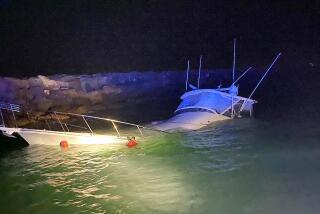Jury Begins Deliberations on Blame in Fatal Crash of Police Helicopter
- Share via
A jury Wednesday began debating whether to convict an Anaheim man of murder for leading police on a frenzied 1987 chase that led to the deaths of three men in a helicopter crash.
Vincent William Acosta, who will turn 22 next week, could face 45 years to life in prison if the jury finds him guilty of second-degree murder in the crash.
The key facts of the case remained virtually undisputed over the course of a weeklong trial before Superior Court Judge Robert R. Fitzgerald.
After stealing a car on the night of March 10, 1987, Acosta led police on a wild, 45-minute chase through the highways and surface streets of the county, at times reaching reported speeds of 90 m.p.h.
About 12 minutes into the chase, two police helicopters collided in the sky above Irvine. Two officers and a civilian observer died in a fiery crash when their Costa Mesa police helicopter gave up the lead in the chase to a Newport Beach Police copter, then inexplicably doubled back and collided with the second helicopter. Officers in the Newport copter were not seriously hurt.
In their summations Wednesday, the prosecutor and defense attorney used those facts to offer jurors widely different legal theories about Acosta’s responsibility.
State courts have generally held that a person can be criminally responsible--and convicted of murder--for the deaths of pursuing police officers, pedestrians or other motorists that result from the driver’s utter recklessness and disregard for safety.
But the Acosta case is the first known in the state, perhaps the nation, that seeks to extend that responsibility to the skies.
Deputy Public Defender William Kelley argued that the distinction means Acosta should be cleared of murder charges because he could not reasonably be expected to predict that his recklessness could result in the deaths of three men in a helicopter.
“It would be stupid and absurd of me to stand here before you and argue that it’s safe and OK to drive 90 miles an hour for 40 miles through Orange County,” Kelley told jurors.
“I’m not here to defend (Acosta’s) character. And I’m not here to tell you he didn’t do something dangerous. I’m here to tell you he’s not guilty of murder,” Kelley said.
He blamed pilot error for the accident.
Deputy Dist. Atty. Thomas J. Borris maintained that Acosta realized the dangers of driving at high speeds without headlights--disobeying traffic laws all the while--but took the risk anyway and caused the helicopter collision.
That choice by Acosta, the prosecutor said, makes the defendant guilty of murder.
“Everything Mr. Acosta did that night was intentional,” Borris said. “The most telling evidence that we have that Mr. Acosta performed the dangerous acts in conscious disregard for human life are his own words.”
Acosta reportedly told police after the crash that “yeah, I knew it was dangerous--to the bone,” but continued his escape bid anyway, because he wanted to get home and feared going to jail, Borris said.
The jury will resume deliberations this morning.
More to Read
Sign up for Essential California
The most important California stories and recommendations in your inbox every morning.
You may occasionally receive promotional content from the Los Angeles Times.










